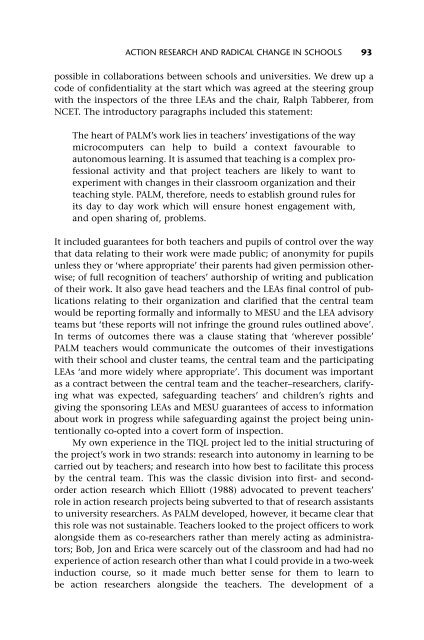Action Research A Methodology for Change and Development
Action Research A Methodology for Change and Development
Action Research A Methodology for Change and Development
You also want an ePaper? Increase the reach of your titles
YUMPU automatically turns print PDFs into web optimized ePapers that Google loves.
ACTION RESEARCH AND RADICAL CHANGE IN SCHOOLS 93<br />
possible in collaborations between schools <strong>and</strong> universities. We drew up a<br />
code of confidentiality at the start which was agreed at the steering group<br />
with the inspectors of the three LEAs <strong>and</strong> the chair, Ralph Tabberer, from<br />
NCET. The introductory paragraphs included this statement:<br />
The heart of PALM’s work lies in teachers’ investigations of the way<br />
microcomputers can help to build a context favourable to<br />
autonomous learning. It is assumed that teaching is a complex professional<br />
activity <strong>and</strong> that project teachers are likely to want to<br />
experiment with changes in their classroom organization <strong>and</strong> their<br />
teaching style. PALM, there<strong>for</strong>e, needs to establish ground rules <strong>for</strong><br />
its day to day work which will ensure honest engagement with,<br />
<strong>and</strong> open sharing of, problems.<br />
It included guarantees <strong>for</strong> both teachers <strong>and</strong> pupils of control over the way<br />
that data relating to their work were made public; of anonymity <strong>for</strong> pupils<br />
unless they or ‘where appropriate’ their parents had given permission otherwise;<br />
of full recognition of teachers’ authorship of writing <strong>and</strong> publication<br />
of their work. It also gave head teachers <strong>and</strong> the LEAs final control of publications<br />
relating to their organization <strong>and</strong> clarified that the central team<br />
would be reporting <strong>for</strong>mally <strong>and</strong> in<strong>for</strong>mally to MESU <strong>and</strong> the LEA advisory<br />
teams but ‘these reports will not infringe the ground rules outlined above’.<br />
In terms of outcomes there was a clause stating that ‘wherever possible’<br />
PALM teachers would communicate the outcomes of their investigations<br />
with their school <strong>and</strong> cluster teams, the central team <strong>and</strong> the participating<br />
LEAs ‘<strong>and</strong> more widely where appropriate’. This document was important<br />
as a contract between the central team <strong>and</strong> the teacher–researchers, clarifying<br />
what was expected, safeguarding teachers’ <strong>and</strong> children’s rights <strong>and</strong><br />
giving the sponsoring LEAs <strong>and</strong> MESU guarantees of access to in<strong>for</strong>mation<br />
about work in progress while safeguarding against the project being unintentionally<br />
co-opted into a covert <strong>for</strong>m of inspection.<br />
My own experience in the TIQL project led to the initial structuring of<br />
the project’s work in two str<strong>and</strong>s: research into autonomy in learning to be<br />
carried out by teachers; <strong>and</strong> research into how best to facilitate this process<br />
by the central team. This was the classic division into first- <strong>and</strong> secondorder<br />
action research which Elliott (1988) advocated to prevent teachers’<br />
role in action research projects being subverted to that of research assistants<br />
to university researchers. As PALM developed, however, it became clear that<br />
this role was not sustainable. Teachers looked to the project officers to work<br />
alongside them as co-researchers rather than merely acting as administrators;<br />
Bob, Jon <strong>and</strong> Erica were scarcely out of the classroom <strong>and</strong> had had no<br />
experience of action research other than what I could provide in a two-week<br />
induction course, so it made much better sense <strong>for</strong> them to learn to<br />
be action researchers alongside the teachers. The development of a

















